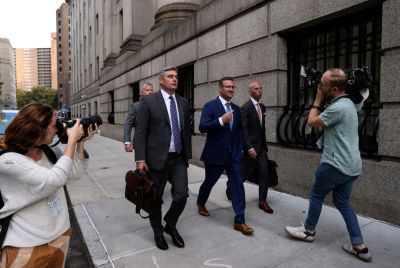Blair voices defiance over Iraq war
LONDON - Former Prime Minister Tony Blair made a defiant defence of the 2003 U.S.-led invasion of Iraq Friday, saying the September 11 attacks in the United States meant Saddam Hussein had to be disarmed or removed.
Facing the first official public grilling on why he sent 45,000 British troops to war in Iraq, Blair said the policy of containing Saddam's weapons of mass destruction (WMD) program had failed and the former Iraqi leader had to be dealt with.
The decision to go to war was the most controversial episode of Blair's 10-year premiership, provoking huge protests, divisions within his Labour Party and accusations he had deceived the public about the reasons for invasion.
This isn't about a lie, or a conspiracy, or a deceit, or a deception, this is a decision, said Blair, who initially looked nervous before becoming more confident as the hearing went on.
And the decision I had to take was, given Saddam's history, given his use of chemical weapons, given the over 1 million people whose deaths he caused, given 10 years of breaking U.N. resolutions, could we take the risk of this man reconstituting his weapons programme?
I believed ... that we were right not to run that risk, added Blair, saying he was convinced Saddam's Iraq had WMD capability even though no such weapons have ever been found.
The Iraq war sapped support for Blair and his Labour Party and seven years after the invasion to topple Saddam, and almost three years after Blair handed over to Gordon Brown, the issue still provokes deep public anger.
Commentators say the inquiry could damage Labour before an election due by June with the party trailing in opinion polls after 13 years in power.
VIEW CHANGED
Under close questioning from the five-member panel, Blair, 56, was unrepentant over the stand he took with then U.S. President George W. Bush.
Dressed in a dark blue suit and red tie, Blair began by explaining how his and the U.S. view of Iraq dramatically changed after the September 11, 2001 al Qaeda attacks, linking the issue of rogue states and WMD.
Up to September 11, we thought he (Saddam) was a risk but we thought it was worth trying to contain it, Blair said.
The point about this act in New York was that had they been able to kill even more people than those 3,000, they would have. And so after that time, my view was you could not take risks with this issue at all.
Blair said he was concerned that the risk remained today, referring repeatedly to concerns over Iran's nuclear program.
Critics have long argued that Blair promised Bush in April 2002 that Britain would support military action to get rid of Saddam, and later arguments about WMD were designed to fit this objective.
The only commitment I gave, and gave openly, was a commitment to deal with Saddam, he said.
The fact is, it was an appalling regime and we couldn't run the risk of such a regime being allowed to develop WMD. If that means regime change, so be it. If we tried the U.N. route and that failed, my view was it had to be dealt with.
Relatives of some of the 179 British soldiers killed in Iraq joined protesters outside the inquiry venue opposite parliament. They were held back by a large police presence.
The real question Tony Blair needs to answer in the end will be at The Hague and before a war crimes tribunal, said Andrew Murray, chairman of Stop the War Coalition.
(Additional reporting by Kylie MacLellan; editing by Andrew Dobbie)
© Copyright Thomson Reuters 2024. All rights reserved.





















